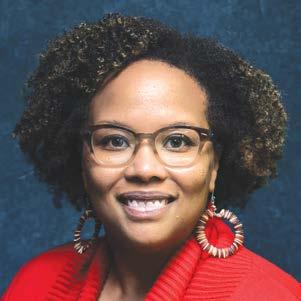
2 minute read
Focus on Faculty The Secret Significance of School Nurses
from Humanitas
by ucinursing
for students. This area of research came to her by chance, when she was introduced to an exceptionally rich trove of data relating to school nursing in North Carolina, where she grew up and spent two decades of her career.

Advertisement
Nonetheless, she recalls, “I left that meeting thinking, ‘I’ve got to do this!’ The data was mesmerizing.”
What that data told Best about school nursing in North Carolina became the subject of her PhD. Looking specifically at children with the chronic health conditions of asthma and diabetes, she found that “the presence of the school nurse reduced the number of days missed; it increased children’s ability to manage their own conditions. There’s also lots of evidence of how much of the principal’s and teachers’ time is saved when there’s a nurse around.” She points out that, “Schools are charged with providing a safe environment for kids, and nurses help do this.” Kids missed less school not just because they were less ill, but because parents were able to trust that the school was a safe place for their child to be.
“If kids aren’t healthy, they can’t learn.”
UCI Assistant Professor Nakia Best doesn’t tend to exaggerate: when she makes a statement, she has the data to back it up. A self-confessed data-nerd with a nursing PhD from UNC Chapel Hill and a post-master’s degree from Johns Hopkins University in health informatics, she is passionate about translating the story that the data-based evidence tells.
“When school nurses are in the building, kids are healthier,” she explains. “The goal is for kids to have medical access to a nurse every day. That’s not the case in the United States, where 25% of schools have no nurse.”
Best never expected nor planned to find herself an expert on the relationship between the availability of school nurses and educational outcomes
Best’s practice had been as an ICU nurse in cardiothoracic surgery but, she says, “I’ve always been interested in how we’re using tech to improve healthcare.” She’d already left ICU nursing for teaching and research when, after her post-master’s, her question became, “Was there a way to marry informatics with critical care?”
The initial focus of her PhD was to do with ways to improve nursing information capture in the electronic health record.
Best’s mentor, however, introduced her to North Carolina’s supervisor for school nursing, who had come to a healthcare community meeting looking for help. The state’s Department of Health & Human Services had been painstakingly collecting data about school nursing since the 1990s, and no one had ever put it to good use.
Best laughs about her own reaction when her mentor first put her forward as a possible candidate: “I knew NOTHING about school nursing. I hadn’t worked with kids. I never worked in pediatrics. I don’t have kids. My parents said that even when I was a kid, I was a little adult!”
On completing her PhD, Best still had questions about the experiences of school nurses and their impact on communities. But changing topics part-way through her PhD meant that she’d spent six years researching and writing, and she was exhausted and in need of a chance to recharge. She returned to teaching at University of North Carolina, Greensboro, where she’d done her initial master’s degree in nursing education.
“I always liked teaching new nurses,” she says, again recalling a childhood trait. “My parents told me, ‘You love teaching!’ When I was a kid, I would literally sit my sister down and get a blackboard and teach her math from my grade. She’d be doing 5th grade math when she was in 1st grade!”
For someone who is a born educator, researcher and, increasingly, a leader in her field, Best’s account of her career is full of self-deprecating humor, and frequent attributions of her progress to happenstance rather than her own skills and talent. She’s frank about the difficulties of retaining confidence and motivation at times, and is quick to credit others – her mentors, her colleagues and family –for her successes: “I’ll try anything,” she says, “because my parents always









